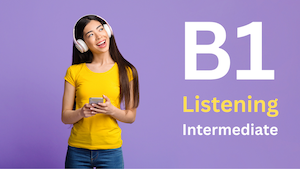Passive Modals of Obligation
Watch four videos using Passive Modals of Obligation in conversation.
Conversation 1 | PDF Worksheet
Man: So, what needs to be done?
Woman: Lots needs to be done.
Man: OK, such as?
Woman: First, all the documents need to be proofread. Then they need to be formatted.
Man: OK, I can do that. Do these need to be translated?
Woman: No, you can leave that for me.
Man: OK, great. I'll get right on it.
Conversation 2 | PDF Worksheet
Woman: Is your new house finished yet?
Man: No, lots still needs to be done.
Woman: Yeah, such as?
Man: Well, the walls still need to be painted, and the wiring still needs to be done.
Woman: Well, at least you're getting close to the end.
Man: True, but until then, no rest.
Conversation 3 | PDF Worksheet
Man: What needs to be done for the party?
Woman: Lots. Let's see. First, the tables need to be set, and the chairs need to be brought down from upstairs.
Man: I can do that.
Woman: Great, but the chairs might be dusty. They may need to be wiped off first.
Man: OK, no problem. Do you have any towels?
Woman: I do. But they're in the washer. They might need to be dried first.
Man: Actually, you know what, they might work better if they're damp.
Woman: Good point. The washer is over there.
Vocabulary - Key Words and Phrases
Conversation 1
Proofread - to read (documents) in order to detect and correct errors.
Formatted - arranged or put into a format, especially the layout of text or documents.
Translated - converted from one language to another.
Leave that for me - to not do something so another person can do it.
Get right on it - start working on it immediately.
Conversation 2
Wiring - electrical systems within the house.
Getting close to the end - nearing the completion of a project or task.
No rest - no opportunity to relax or take a break.
Conversation 3
Tables need to be set - arranging tables with items like tablecloths, dishes, and utensils.
brought down - moving something, usually from a higher floor to a lower one.
Wiped off - cleaned by rubbing, especially to remove dust or dirt.
In the washer - being washed in a washing machine.
Work better if they're damp - referring to the towels' effectiveness when slightly wet.
Damp - wet
Passive Modals of Obligation
- The reports need to be edited.
- We need to edit the reports.
- These packages must be delivered today.
- We need to deliver the packages today.
- The employees need to be notified.
- We need to notify the employees.
- The staff needs to be paid.
- We need to pay the staff.
Point 2: The passive infinitive uses the following pattern:
modal + to + be + past participle.
- The software needs to be updated.
- The chairs need to be brought in from outside.
- The dogs need to be fed.
- The dishes need to be put away.
- The lawn needs to be cut.
- The report needs to be printed.
- The data needs to be analyzed.
- The forms needs to be collected.
- The staff needs to be paid.
The workers need to be paid. - The dog needs to be fed.
The dogs need to be fed. - This has to be done today.
These have to be sent today.
- What cups needs to be washed?
The red ones. The blue ones don't need to be washed. - Do these packages need to be sent?
No, they don’t need to be sent. - Does the staff need to be paid?
No, they don’t need to be paid.
- Those may need to be wiped first.
- The tires might need to be inflated.
- The fruit might need to be washed first.
- She will need to be picked up at the airport.
Gap Fill: Complete the conversation with the correct word!











